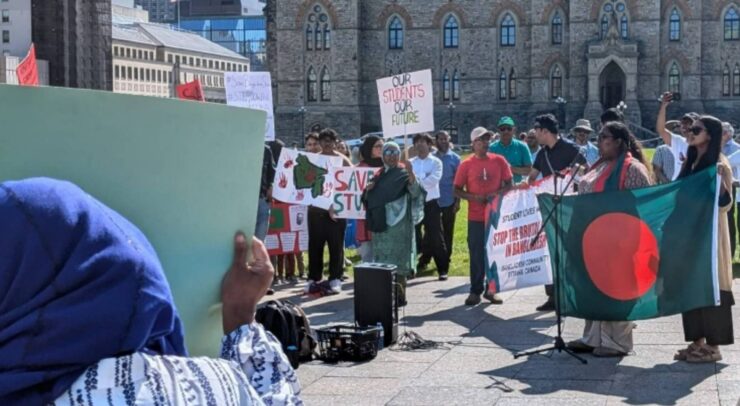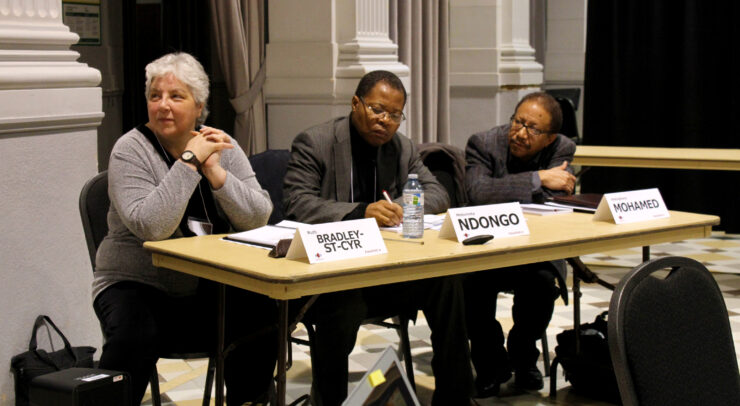Protests are supposed to be disruptive, yelling into a void that is trying to silence you
On Sept. 4, CBC reported that Western University had approved a new policy for on-campus protests right as the school year began.
According to the two-page document, students who wish to host a protest on campus property must submit an application to the director of campus security at least five business days prior to the demonstration, and include attendance numbers, location, and contact information; however, the director can deny the application for any reason, but specifically if it threatens the campus population or property.
This is, in no doubt, in direct response to the widespread student protests for Palestine that occurred across the country from April until July; the Western Divestment Coalition ended their encampment in early July after 60 days. Western’s not the only university to reprimand encampment protestors: in late August, the University of Toronto had published a “User Guide for U of T policies on protests”; around the same time, three McMaster students who participated in the encampment were barred from campus.
The student encampments this past summer were something unseen by university administration. Sure, some student protests are looked back upon with an almost a romantic historical lens, championing the university-educated with pride and honour. But the reality is that they are intense declarations of the people using their own acquired knowledge to full effect, and universities are not prepared to hear out the other side. Threatening personal freedoms aside, obtaining permission doesn’t make sense, as groups have usually used other means — such as open letters — to call attention to the cause before protesting.
Protests are not simply events that aim to disrupt daily activities — they’re demanding conversations with those in power, yelling into a void that is trying to silence them. But ignoring them or shutting them down, like the U of O tends to, does not make them go away.
Two sides of the same expression
In fall 2020, the Fulcrum reported that a professor at the U of O said the N-word (a racial slur) in class. This incident sparked national debate about what was and wasn’t allowed to be said in an academic setting, with little participation from the Black students who might actually be affected by this, even years after the events.
In December 2020, a group of students who opposed the then-newly formed committee on anti-racism and inclusion, held a sit-in at Tabaret Hall for six days. Despite making multiple requests to talk to the university about their concerns, the university requested that the meeting be pushed another day for better preparation (as if the protestors were not outside their offices for nearly a week).
As the university announced its Committee on Academic Freedom in spring 2021, it was reported that not a single student (undergraduate or graduate) was on the committee — a first of its kind for university committees — despite attending an institution that trains and challenges them to exercise their academic freedoms.
Instead, in fall 2022, students received Policy 130 on Student Rights and Responsible Conduct. Distributed across campus during a time when few students were physically on-campus, Policy 130 “affirms student rights and…to define responsible conduct and a breach of responsible conduct”.
In Appendix 3, the university considers it a “breach of responsible conduct”, should a student “make a recording of a person and to publicly disseminate it, when such a record is of a professor’s lecture or class or is of a private conversation or of a person at a time and place where that person would have reasonable expectation of privacy and such record or image is likely to cause injury or distress”.
This is the only emboldened part of the webpage, and it is clear as to what this is referring to. But the issue isn’t respecting the students’ or faculty’s right to privacy in an academic setting, where you should be encouraged to be wrong and ask questions you might think are inappropriate — the issue is threatening a student’s potential means of flagging something they know is wrong. And this isn’t just making a joke out of today’s lecture — it’s a student who felt harm about the slur that was used.
The university has a very public precedent of devaluing student input. Going behind students’ backs and drafting policies are not actions of transparency or academic pursuit, it is rather a means of cowardice and dishonesty. Establishing boundaries against harassment or property damage are important, but if they are valued over the efforts of honest and open communication, then they are facades.
There is no “easy way” when it comes to protests and demonstrations — that’s the point. However, if universities truly want to make their campus a better place, they’ll work with the students who are actively contributing to that very effort.





